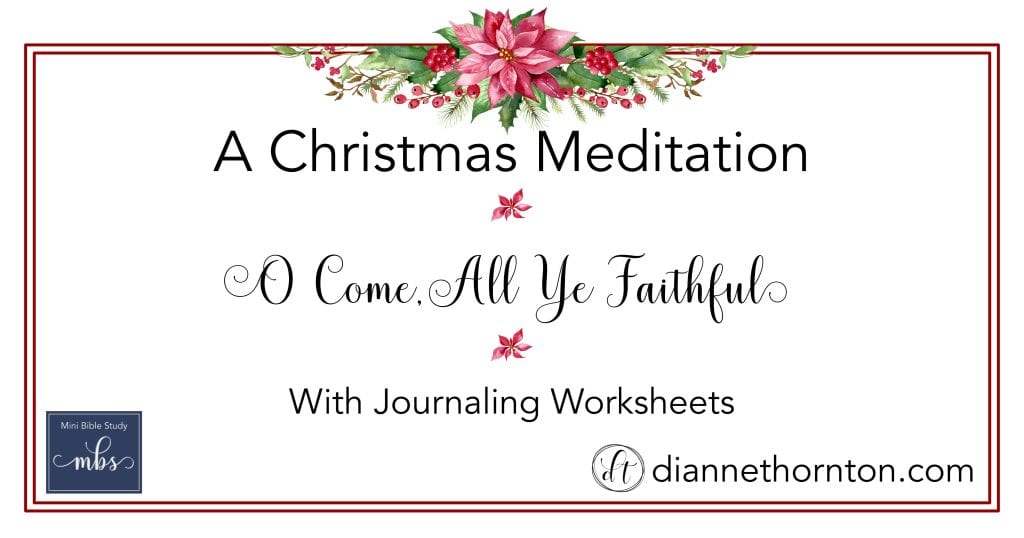A Christmas Meditation — “O Come All Ye Faithful”
How often do we sing songs without paying attention to the lyrics? It’s easy to do, especially with songs we’ve sung many times. When it comes to songs of faith, however, paying attention (even meditating on them) can change our entire perspective. That’s what I’ve done with the beloved Christmas carol, “O Come All Ye Faithful,” which is one of my favorites. Maybe it’s one of yours, too. Surprisingly, it was not included in my Advent devotional. (If you haven’t chosen, or considered reading, an Advent devotional, I encourage you to check out the one I just published. It is so sweet!)

However, I want to devote some attention to it in the context of worship—specifically praise. (To read more about the different facets of worship, see my post What Is the Difference Between Praise, Thanksgiving, and Worship?).
It’s easy to wallow in the muck and mire of contemporary living. Intentional worship through praise helps us shift our focus from the temporal to the eternal. Praise helps us see God as He is. We submit ourselves to His leadership and elevate Him above ourselves.
So we fix our eyes not on what is seen, but on what is unseen, since what is seen is temporary, but what is unseen is eternal. (2 Corinthians 4:18)
John Francis Wade is the author and composer of our song, which was originally written in Latin in 1743. In 1841, Frederick Oakeley translated it into English.1 The hymn is a “modern-day” psalm with a call to worship Jesus Christ in joyful, triumphant praise!
Considering this, we will look at each element of the carol, asking the standard “5Ws and an H” questions (who, what, where, when, why, and how), although not all will not be applicable. Then we will meditate on each portion with Scriptures that support them. This meditation is one you can “sink your teeth into.” It will take a few days to complete!
To set the stage, let’s begin with the refrain.

Throughout this post, I’ve included opportunities for you to pause and meditate on the lyrics and their associated Scriptures. In addition, I developed some beautiful journaling pages with the same journaling prompts you’ll see here. If you’re an email subscriber, you can find these on my Resource Page or you can click here.
Refrain
O come, let us adore Him.
O come, let us adore Him.
O come, let us adore Him, Christ, the Lord.
The word “come” is an invitation. Its repetition shows the eagerness with which the author invites us.
To what? To adore. In our contemporary world, when we adore someone, we love them. We feel emotionally attached to them. We enjoy simply looking at them! Examining this hymn, we can see it includes honor, worship, and praise.
Come, let us sing for joy to the Lord; let us shout aloud to the Rock of our salvation. Let us come before him with thanksgiving and extol him with music and song…Come, let us bow down in worship, let us kneel before the Lord our Maker. (Psalm 95:1-2, 6)
Who do we adore? Christ, the Lord! The name Christ refers to Jesus’ role as Messiah, God’s promised Deliverer.2 The Lord in Greek is kúrios, which means master. It is the New Testament equivalent to Yahweh.3
MEDITATION ON REFRAIN – O Come All Ye Faithful
Consider invitations you’ve extended to others or those you’ve received. How can you reword this refrain as an invitation for others to join you in celebration?
We’ll keep this in mind as we look at each verse!
Verse One
O come, all ye faithful, joyful and triumphant,
O come ye, O come ye to Bethlehem!
Come, and behold Him, born the King of angels!
Once again, we have the invitation to come!
Who is invited? Those who are faithful! This is for believers.
How are we to come? With a joyful and triumphant spirit. Think about what triumphant means. I live in Texas, so football and Friday Night Lights are a thing. As the regular season comes to a close, playoffs are in view. Each win and subsequent advance to the next bracket brings anticipation and excitement! There’s nothing quite like winning a difficult contest. In fact, last weekend we had a huge contest between two university rival teams. These, however, pale compared to the spiritual battles waged against us. The good news is, we’ve already won! We take that spirit of victory and combine it with joy as we join others in worship!
Where do we worship? Although most of us won’t travel to Bethlehem literally, we can go there in our hearts and minds. To the place where Jesus was born on that dark, lonely night.
What does our worship look like? We are invited to come and behold Him. We gaze at this little baby, knowing He is God in the flesh. And, as the next phrase says, He’s the King of angels! It seems like a dichotomy—this helpless baby is the Creator and Ruler of the Universe! That is something to behold!
MEDITATION ON VERSE ONE
Read Luke 2:1-20. Consider the shepherds and the message the angels gave them. Focus on verses 15-16. What did they do? How can you do the same thing?
Verse Two
Sing, choirs of angels; sing in exultation;
Sing, all ye citizens of heav’n above!
Glory to God, all glory in the highest! [Refrain]
Verse two picks up where verse one left off. The invitation is now extended to the angels, who are invited to sing in exultation. In Hebrew, exalt means to raise or lift up.4 In a standard English dictionary, it means lively or triumphant joy, as over success or victory.5 Sound familiar?
Next the call to worship includes all the citizens of heaven! This is not just the angels! It is all who have passed before us and chosen Christ as their Savior!
What did they sing? “Glory to God, all glory in the highest!” It’s the song the angels sang to the shepherds (Luke 2: 13-14)! The word glory describes God’s majesty and splendor. Giving God glory is honoring Him and extoling His attributes through worship.
Ascribe to the Lord, you heavenly beings, ascribe to the Lord glory and strength. Ascribe to the Lord the glory due his name; worship the Lord in the splendor of his holiness. (Psalm 29:1–2)
In the highest extends their praise. The first few verses of the psalm below call everything God created in the heavens to praise Him, just as verse two of our Christmas carol does.
Praise the Lord. Praise the Lord from the heavens; praise him in the heights above. Praise him, all his angels; praise him, all his heavenly hosts. Praise him, sun and moon; praise him, all you shining stars. Praise him, you highest heavens and you waters above the skies. (Psalm 148:1–4)
MEDITATION ON VERSE TWO
Read Psalm 66. How does the psalmist glorify God? How can you glorify God?
Verse Three
Yea, Lord, we greet Thee, born this happy morning;
Jesus, to Thee be all glory giv’n!
Word of the Father, now in flesh appearing! [Refrain]
Verse three invites us to see Jesus as God Himself. Before that, however, we say yes; we agree with God. More than that, we say yes, Lord. These two words are worthy of meditation all on their own! By saying Lord, we agree Jesus is Master over every aspect of our lives.
In the same way we give God glory, we give Jesus glory.
Why do we give Jesus gory? Because He is the Word of the Father.
In the beginning was the Word, and the Word was with God, and the Word was God…The Word became flesh and made his dwelling among us. We have seen his glory, the glory of the one and only Son, who came from the Father, full of grace and truth. (John 1:1, 14)
MEDITATION ON VERSE THREE
Read Philippians 2:9-11. Do you recognize Christ’s lordship in your life? Do you submit to His direction?
Read John 1:1-4 and Colossians 1:15-20. How do these verses show Christ’s deity.
Scripture describes many ways in which Jesus is glorified. Read the following verses and identify how Jesus would received glory. John 2:11; John 17:4; 2 Peter 1:17
Bridge
For to us a child is born, to us a son is given, and the government will be on his shoulders. And he will be called Wonderful Counselor, Mighty God, Everlasting Father, Prince of Peace.(Isaiah 9:6)
The virgin will conceive and give birth to a son, and they will call him Immanuel (which means “God with us”). (Matthew 1:23)
My favorite rendition of this classic hymn is by Passion, featuring Melodie Malone. After singing these verses, they add a bridge which is straight from Isaiah 9. They titled it “His Name Shall Be.”
They finish with the proclamation that His Name will be Immanuel; and we will praise His Name forever! It’s so moving. You can check it out at this link on YouTube
MEDITATION ON THE BRIDGE
Consider these names of Jesus, along with some cross-references for each of these magnificent titles. Jot down a word or two that describes each one. How has He met your needs in one or more of these ways?
- Wonderful Counselor (Isaiah 11:1-2; James 1:5)
- Mighty God (Isaiah 44:6; Ephesians 1:18-21)
- Everlasting Father (Psalm 90:2; Isaiah 40:28)
- Prince of Peace (Isaiah 26:3-4,12; John 14:27)
And finally …
Immanuel — God With Us (Isaiah 41:10; Romans 8:31)
It’s easy to sing our favorite Christmas Carols, simply falling into the melodies. But if we take time to think through the lyrics as they relate to Scripture, we can connect with the author’s original intent much more effectively. As a result, they have much more meaning and don’t become hollow words. Instead, we anchor them in Scripture.
The next time you sing this Christmas carol, may your heart be encouraged as you remember the God’s gift of His Son.
Merry Christmas!
1 “O Come, All Ye Faithful.” Hymnary.org. Accessed November 30, 2024. https://hymnary.org/text/o_come_all_ye_faithful_joyful_and_triump.
2 Spiros Zodhiates, The Complete Word Study Dictionary: New Testament, 2000, 5547.
3 Spiros Zodhiates, The Complete Word Study Dictionary: New Testament, 2000, 2962.
4 Warren Baker and Eugene E. Carpenter, The Complete Word Study Dictionary: Old Testament, 2003, 1042.
5 “Exultation Definition & Meaning.” Dictionary.com. Accessed November 16, 2024. https://www.dictionary.com/browse/exultation.

